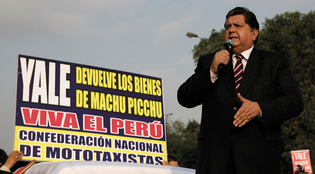 loading
loading
Light & VerityMachu Picchu artifacts to return to Peru Reuters/Mariana BazoPeruvian president Alan Garcia addresses marchers at a November 5 rally in Lima calling on Yale to return Machu Picchu materials to Peru. View full image
No one is breaking out the champagne just yet, but a recently signed memorandum of understanding between Yale and Peru could mean that a long and acrimonious dispute over artifacts from the ancient Inca citadel, Machu Picchu, will finally be resolved. The upshot? Yale's giving it all back. A selection of museum-quality artifacts will be sent to Peru in time for the centennial of Hiram Bingham's 1911 Machu Picchu expedition, which first brought the site to worldwide attention. The rest of the materials Bingham '98 brought to Yale's Peabody Museum—some 5,400 lots, overwhelmingly of potsherds, bones, and other fragments—will be returned over the next two years. The Peruvian government has been trying to get the items back since 2003. Yale and Peru signed a memorandum of understanding in 2007, under which the museum-quality artifacts would return to Peru while most of the material would stay at Yale for study for up to 99 years. But a year later, Peru withdrew from the agreement and filed a lawsuit in U.S. federal court for return of everything, and the dispute has become a highly fraught national cause. This fall, Peru stepped up public pressure: in early November, Peruvian president Alan García led a demonstration in the streets of Lima demanding that Yale return the artifacts. He wrote letters to President Obama and met with Connecticut senator Christopher Dodd. He told Reuters in September that Yale would be "guilty of robbery" if it didn't return the items. In the talks that followed, the former president of Mexico, Ernesto Zedillo ’81PhD, negotiated for Yale directly with the president of Peru. Zedillo is director of Yale's Center for the Study of Globalization; he was joined in the talks by Peabody Museum director Derek Briggs. García announced the new agreement in late November with kudos to Yale: "Yale University preserved these artifacts, which otherwise would have ended up scattered in private collections around the world or would have even disappeared." Why did Yale decide to return the objects, after resisting for so long? The international pressure is a likely factor. In addition, the new agreement (still being formalized) includes detailed provisions about the care of the artifacts, including a partnership between Yale and the National University of San Antonio Abad in Cusco (UNSAAC)—one of the longest-established universities in the western hemisphere, nine years older than Yale. UNSAAC had not been part of earlier agreements, and its involvement made Yale officials more comfortable with returning the artifacts. "We feel good about collaborating with an institution that has a tradition of caring about materials like these as much as we do," says anthropology professor and Machu Picchu specialist Richard Burger ’72. The Peruvian government has committed to building a museum and research center where the artifacts will be accessible to scholars; it will be run jointly by officials from Yale and UNSAAC. The Machu Picchu dispute is one of many simmering worldwide over the issue of cultural repatriation. Will Yale's decision up the ante for other institutions? Yale president Richard Levin ’74PhD says Machu Picchu is a special case. "There is a distinction here between this collection and other things that we might possess in our museums," says Levin. "This was the site of the Incan empire. … This goes right to the heart of Peruvian national identity." But James Cuno, director of the Art Institute of Chicago and a critic of repatriation, isn't so sure. "I'm sure Yale wasn't thinking about and didn't need to think about what precedent it might set," he says. "They did what they had to do. But every claim that is resolved is going to be looked to as an example."
The comment period has expired.
|
|